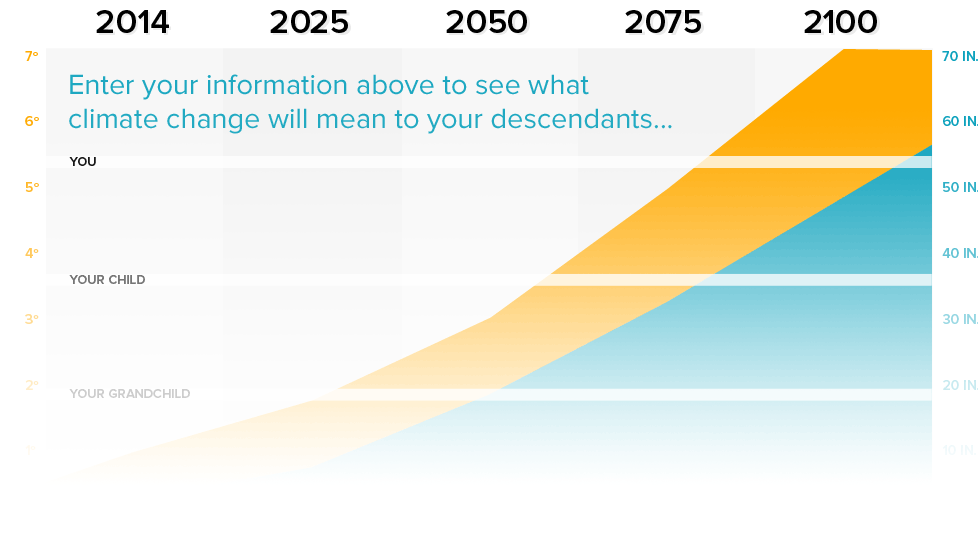CLIMATE IMPACTS BY 2100
If we do not take timely and significant action to address climate change,
your descendants will live in a world in which...
Sea-level Rise
Parts of Boston, New York, Washington, Miami, New Orleans, and other coastal cities will be flooded, and your descendents will not be able to live in these areas. The beaches you went as a child and with your children will likely be gone, taken away by rising levels and storm surges that accompany that rise.
Extreme Weather
Your descendants will experience drier droughts and wetter storms, both occurring more frequently. Much of the Southwest U.S. will be in permanent drought conditions. In many areas, water will be a more precious resource and your descendants will pay more for it.
Disease
Crop pests, weeds, and disease will shift in geographic range and frequency. Your descendents may face diseases that you never experienced.
Recreation
Your descendants may not have the same opportunity as you did to ski, snowboard, or engage in other winter outdoor activities. The Western U.S. may see an average 20% reduction in snowpack, and many other parts of the U.S. will see less snowfall and a shorter cold season.
Nature
Crop yields will decrease, and crops will need to be grown in different places. Your descendants may pay more for food as a result.
Economy
Your descendents and their government will have to spend billions on responding to natural disasters caused by climate change. This will leave the government with less money to pay for your descendants’ schools, social security, and public services.
*Temperature increase is a visual approximation from a mid-range emissions scenario from the U.S. Global Change Research Program 2009 report, "Global Climate Change Impacts in the United States". http://library.globalchange.gov/products/assessments/2009-national-climate-assessment/2009-global-climate-change-impacts-in-the-united-states.
*Sea-level rise increase is a visual approximation from a mid-range emissions scenario from the 2010 National Research Council report Advancing the Science of Climate Change. http://nas-sites.org/americasclimatechoices/sample-page/panel-reports/87-2/
*World Bank. “Turn Down the Heat: Why a 4°C Warmer World Must Be Avoided”. November 2012.
http://climatechange.worldbank.org/sites/default/files/Turn_Down_the_heat_Why_a_4_degree_centrigrade_warmer_world_must_be_avoided.pdf
*Romm, Joe. “An Illustrated Guide to the Science of Global Warming Impacts: How We Know Inaction Is the Gravest Threat Humanity Faces”. Climate Progress. October 14, 2012.http://thinkprogress.org/climate/2011/09/28/330109/science-of-global-warming-impacts/
*National Academy of Sciences. “Climate Change: Evidence, Impacts and Choices”. http://nas-sites.org/americasclimatechoices/files/2012/06/19014_cvtx_R1.pdf
*National Academy of Sciences. “Climate Change: Evidence, Impacts and Choices”. http://nas-sites.org/americasclimatechoices/files/2012/06/19014_cvtx_R1.pdf
*World Bank. “Turn Down the Heat: Why a 4°C Warmer World Must Be Avoided”. November 2012.

